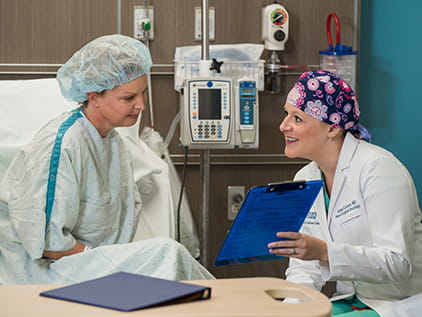Cancer Surgery
As our understanding of cancer grows, new techniques to prevent and alleviate the growth of tumors have multiplied. Surgery, however, remains the backbone of cancer diagnosis and treatment. Cancer surgery can also relieve discomfort or problems related to cancer, as well as help doctors determine the stage of growth a cancerous growth has reached.
Our surgical oncologists are specialty trained to provide comprehensive surgical care for the removal of tumors. Our surgical oncologists work closely with other specialists at The University of Kansas Cancer Center to develop individualized cancer treatment plans.
What is cancer surgery?
Cancer surgery typically means the removal of a tumor from a specific organ or part of the body. Oncologists do this to diagnose the type and severity of a cancerous growth and to treat it by removing it as completely as possible.
There are a number of broad types of cancer surgery based on the needs of the patient and the outcome desired:
Cancer surgeries are almost always accompanied by other cancer treatments such as chemotherapy, radiation therapy and immunotherapy. Surgical procedures help doctors understand the scope of a cancerous growth and support less invasive treatments.
We offer a variety of appointment types. Learn more or call 913-588-1227 to schedule now.
Who can have cancer surgery?
Not all people who have been diagnosed with cancer need cancer surgery. Especially when caught in its earliest stages, a small cancerous growth may be eliminated with treatments such as chemotherapy. However, as a tumor grows, so does the potential for surgical removal.
Anyone who has been recommended to an oncologist or received a cancer diagnosis may be a candidate for cancer surgery. In some cases, those with a family history of cancer may also be referred to a cancer specialist.
How does cancer surgery work?
Primary cancer surgery is concerned with the complete removal of cancerous tissue. Some healthy tissue is also removed along with a lymph node to assess the spread of cancer throughout a patient’s body. In some cases, an entire limb or organ must be removed, resulting in a loss of function. This can cause impairment or require a mechanical replacement.
Expert oncologists have created a host of minimally invasive techniques for destroying cancer cells in the body. Cancer surgeons at The University of Kansas Health System use leading-edge techniques to treat peritoneal surface malignancy, a variety of tumors that develop in the membrane or in organs within the abdominal cavity. At one time, these tumors were considered incurable.

Cancer care you can count on
The University of Kansas Cancer Center is 1 of fewer than 60 NCI-designated comprehensive cancer centers in the nation, and it's part of The University of Kansas Health System.
Benefits and risks of cancer surgery
All surgeries come with some risk. However, for those facing a serious cancer diagnosis, the reward of cancer surgery far outweighs those risks. Modern techniques for minimally invasive cancer surgeries also improve outcomes.
The primary risk for anyone undergoing a surgical procedure is infection. It is important to keep the area that received the cancer surgery clean. Antibiotic medicine may also be prescribed to prevent infection.
Pain is also a factor in any surgical procedure. The degree of pain depends on the size and severity of a person's surgery and their own subjective feelings of pain. Before your surgery, your cancer care team will work out a pain management plan to help you communicate how you feel afterward.
What happens during cancer surgery?
Traditional cancer surgery techniques involve cutting into the body to remove cancerous cells along with surrounding healthy cells. The goal is to prevent the cancer from coming back. Nearby tissue such as lymph nodes also may be removed and tested for cancer to determine if the cancer has spread.
There are many modern techniques that can reduce surgery time and improve outcomes. Laser surgery, cryosurgery (the use of a very cold material to freeze and kill cancer cells) and electrosurgery (the use of high-frequency electrical current to kill cancer cells) are a few examples of techniques that may be used during your surgery.
Why choose us for cancer surgery
Each of our surgical oncologists specializes in 1 or 2 specific types of tumor removal. All of our surgeons are faculty members at the University of Kansas School of Medicine. As experts in their fields, they teach the most effective, least invasive surgical techniques to other physicians.
Patients also benefit from new advancements that our surgical oncologists develop through clinical research. Many patients qualify to participate in these clinical trials that lead to innovations in cancer treatment.

Turning Point
Turning Point offers free classes, programs and tools designed to empower and educate people affected by chronic or serious illness.




